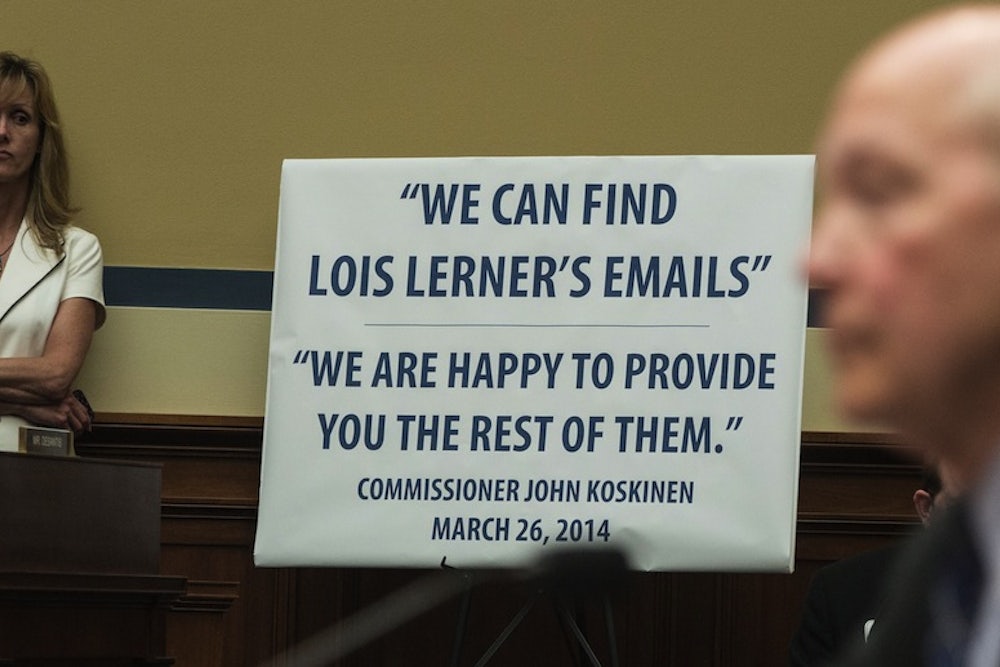We know that there aren't many scientists in the Republican congressional delegation, because if there were, they couldn't use the "I'm not a scientist" excuse to duck questions about climate change.
But by sheer coincidence, pretty much every Republican in Congress who's "not a scientist" turns out to be an IT expert, and they've rendered a unanimous judgment: The official explanation of the missing Lois Lerner emails is a lie, and the IRS is perpetrating a coverup.
No less a figure than John Boehner (who's not a scientist) says the IRS' version of events—that the emails were lost in a hard-drive crash and the backups wiped off the servers after six months, per the agency's old protocol—"doesn't pass the straight-face test."
But here's the thing nobody covering the latest incarnation of the IRS feeding frenzy can bring themselves to say clearly: It is unconnected to the "scandal" that gave rise to the feeding frenzy in the first place. And that reflects the basic illogic underlying the right's embrace scandal politics. Republicans are no longer investigating allegations. They're assuming the conclusion that a scandal is afoot, and working backwards to prove it.
It is possible that the missing emails contain incriminating evidence of some genuine malfeasance. If they can be recovered they should be. But we're supposed to believe this has something to do with the year-old allegation that the IRS targeted Barack Obama's political enemies—and only his political enemies—for scrutiny and harassment.
We know that's not what happened, though. We know that the IRS identified and scrutinized political groups seeking non-profit status on a somewhat arbitrary, probably inappropriate basis, but that the criteria they used ensnared both liberal and conservative groups. We know that the confusion over how to apply a neutral basis for scrutinizing political non-profits reflects huge ambiguities in law, rather than a bureaucratic zeal to squash free speech.
That would probably have been the final word on the scandal. But then last week, the House Ways and Means Committee announced in horror that the IRS had lost all of Lerner's emails to and from non-IRS employees from January 2009 through April 2011. That's two years before the IRS "scandal" broke. But the prevailing theory on the right is that Lerner (and others?) sabotaged her emails 10 days after she received this letter from Ways and Means committee chairman Dave Camp alleging that the IRS acted inappropriately—perhaps politically?—when examining whether donors to tax-exempt non profits should be on the hook for gift taxes.
That's not the end of the theory, either, because a couple weeks later, Lerner pressed IRS tech employees to do anything they could to retrieve her lost documents, suggesting she didn't intend to destroy them in the first place. Presumably she contacted tech support, and left a paper trail, as a smokescreen—to establish a false alibi.
What's missing from this growing web of conspiracy is any suggestion of what Lerner was trying to cover up. We know the IRS wasn't singling out conservative non-profits. Maybe Lerner decreed via email that the IRS would only scrutinize liberal groups to provide cover for probing the real targets in the Tea Party? It's hard to say.
Then on Wednesday, a new development nudged the right's overweening certainty that a coverup is afoot into a Morton's Fork.
If targeting a sitting GOP Senator was not "accidentally lost" by the IRS, you can only imagine what was in the emails they *did* destroy.
— Josh Jordan (@NumbersMuncher) June 25, 2014The sitting GOP Senator in question is Chuck Grassley. He wasn't "targeted" at all. Instead, Lerner asked a colleague if it made sense to examine whether an outside group had made Grassley an inappropriate offer. Her colleague dismissed the idea, and that was the end of it. The reasoning is specious however you interpret her email, though. One could just as easily argue that the existence of an email "targeting a sitting GOP senator" undermines the case for a coverup. Why leave anything incriminating behind? But the right can't justify its outrage without begging the question. Presumably, if the emails the IRS did hand over included nothing noteworthy, the right would treat it as evidence of a coverup as well.
Heads I win, tails you lose. Question the basis for all this outrage, as a few Democrats on the Hill have, and you'll be tarred for siding with the IRS over taxpayers. There's no way out of this trap on the other end, either. I, too, would like to know what's in those emails; and I, too, would like to know if the IRS' archiving protocols were compliant with federal law; and I, too, would like to see all federal agencies equipped to handle simple IT challenges, like archiving emails, and more complex ones, like procuring an e-commerce website for health insurance plans. At the end of his oversight hearing on Tuesday, Darrell Issa (of all people) identified the government's IT mess as a key contributor to the missing email problem. Yet I'm 100 percent confident that if the IRS or another government agency were to rescue the Lerner emails a week from now, and provide them to Congress, the same people who are currently treating their absence as proof of a coverup would cast their reappearance as a conveniently-timed distraction from some other scandal.
